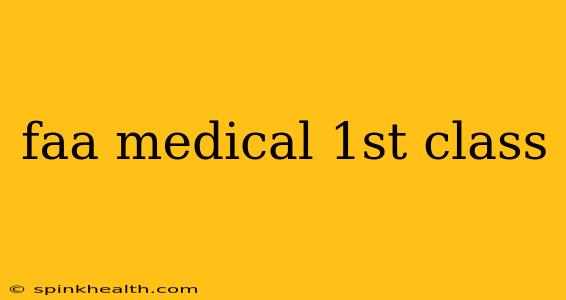The hum of the engine, the thrill of flight – for many aspiring pilots, earning a first-class FAA medical certificate is the gateway to realizing their dreams. But the process isn't always a smooth flight. It involves navigating a complex system of regulations, examinations, and potential challenges. This guide will walk you through the experience, answering common questions and offering insights to help you prepare.
What are the FAA First-Class Medical Certificate Requirements?
Securing a first-class medical certificate demands a higher standard of health than other classes. The FAA meticulously scrutinizes various aspects of your physical and mental well-being, ensuring you meet the rigorous demands of commercial aviation. Think of it as a comprehensive health check designed to protect both you and the passengers you might carry. The specific requirements are detailed in the FAA's regulations, but generally include tests for vision, hearing, cardiovascular health, and neurological function. Failing to meet even one criterion can result in a denial or the issuance of a lower class medical certificate.
How Long Does the FAA First-Class Medical Exam Take?
The duration of the exam itself varies depending on the Aviation Medical Examiner (AME) and your individual health history. Expect to dedicate at least a few hours to the process. It's not just a quick physical; it involves thorough testing and a detailed review of your medical history. Some AMEs may schedule additional testing or consultations if they deem it necessary. Planning for a longer appointment time will help reduce stress and ensure a thorough examination.
What are the Common Reasons for FAA Medical First-Class Denial?
Denial of a first-class medical certificate isn't necessarily a career-ender, but it can certainly be frustrating. Common reasons include:
- Vision problems: Uncorrected vision issues, color blindness (depending on the severity), or eye diseases can be grounds for denial.
- Cardiovascular issues: History of heart conditions, high blood pressure, or abnormal EKG readings are significant concerns.
- Mental health conditions: A history of certain mental health conditions may lead to denial, though this is often assessed on a case-by-case basis.
- Substance abuse: Any history of substance abuse can pose a challenge, requiring a period of abstinence and often additional documentation.
What Happens After Failing an FAA First-Class Medical Exam?
Failing the exam can be disheartening, but it's not the end of the road. You have the right to appeal the decision, providing additional medical documentation or seeking clarification. A second opinion from a specialist, detailed medical reports, and a well-crafted appeal letter can significantly improve your chances of success. The FAA offers resources to guide you through the appeal process. Remember, perseverance and persistence are key.
How Can I Prepare for the FAA First-Class Medical Exam?
Preparation is crucial. Begin by reviewing the FAA's medical standards thoroughly. This will allow you to identify potential areas of concern and address them proactively. Maintain a healthy lifestyle, including regular exercise, a balanced diet, and sufficient sleep. Schedule a pre-exam checkup with your physician to address any pre-existing health issues and ensure everything is properly documented. This will help streamline the process and increase your chances of success.
Can I Appeal an FAA Medical Certificate Denial?
Yes, you can appeal a denial. The appeal process involves submitting additional medical documentation, seeking clarification on the examiner's findings, or providing further details about your health. The FAA provides detailed guidelines on the appeals process, and seeking legal counsel can be beneficial in complex cases.
What are the Costs Associated with the FAA First-Class Medical Exam?
The cost varies depending on the AME and location. Expect to pay several hundred dollars for the exam itself. Any additional testing or consultations will incur separate charges. It's a good idea to clarify fees upfront with the AME to avoid unexpected expenses.
The path to securing an FAA first-class medical certificate demands dedication, thorough preparation, and a commitment to maintaining optimal health. While challenging, the reward of pursuing your aviation dreams makes the effort worthwhile. Remember to consult the FAA's official website for the most up-to-date information and regulations.

